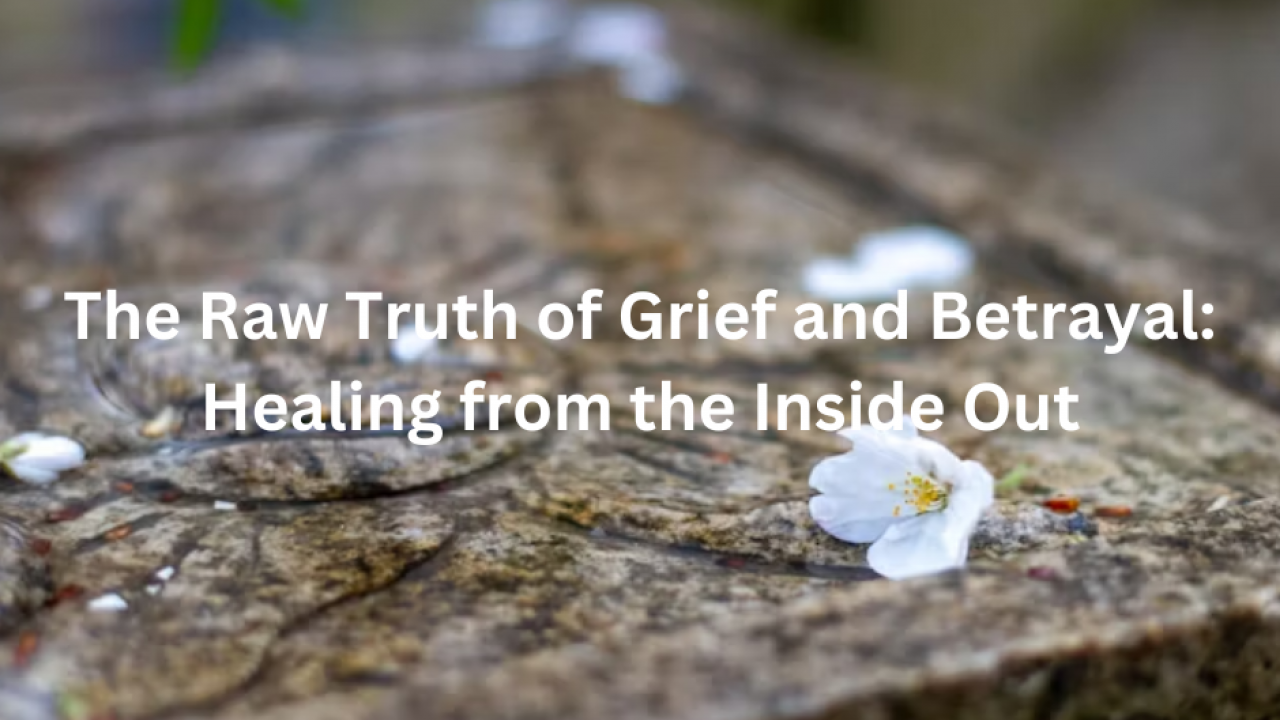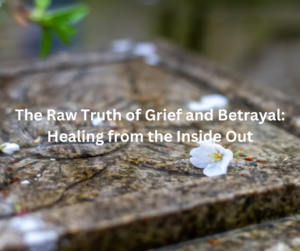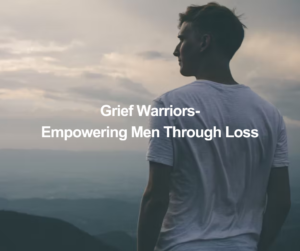In this blog, we delve into the profound journey of grief and betrayal, offering unique perspectives to help recognize the complex emotions and healing processes associated with the deep, unrelenting ache of loss, the shattering of trust, and the struggle to reclaim a sense of self amidst the wreckage.
Grief
Grief is an intense, multifaceted emotional response to a significant loss, predominantly the loss of a loved one. However, grief can also wound the heart when it is the loss of a way of life, shattered hopes, unfulfilled dreams, missed opportunities, broken trust, and the poignant memories of days gone by. The intense emotions of loss unleash a wide range of internal responses such as deep sorrow, rage, guilt, and despair, often accompanied by physical symptoms like fatigue, changes in appetite, and disrupted sleep. Grief is a natural and deeply personal process that can vary widely in its expression and duration, impacting an individual’s mental, emotional, and physical well-being as they navigate through their mourning and gradually adapt to life after the loss.
Betrayal
Betrayal is the act of violating the trust, loyalty, or confidence placed in one by another, leading to feelings of deep disappointment, hurt, and emotional turmoil. It involves a breach of faith and trust, often resulting in a profound sense of disillusionment and a breakdown in relationships. Betrayal can occur in various forms, including infidelity, deceit, or disloyalty, and its effects can be long-lasting, impacting one’s ability to trust and connect with others in the future.
A Different Kind of Betrayal
Betrayal can also arise from the profound sense of abandonment and violation that arises when someone or something you deeply trusted and relied upon is taken from you. This form of betrayal cuts deep and raw, unraveling through the calculated cruelty of others, the reckless arrogance of those in power, and the heartbreaking actions of the hurt, who lash out and project their pain onto those who rely on them. It doesn’t just disrupt plans; it obliterates them, leaving a gaping void that feels impossible to fill. In the wake of this betrayal, we’re left grappling with the jagged pieces of our shattered expectations, trying to navigate a path forward through the wreckage.
Feelings of betrayal can also manifest when those who are entrusted to protect and nurture violate someone’s rights and safety, causing deep emotional scars and a lifelong struggle with trust and security. This betrayal is not just a breach of trust; it is a devastating blow to one’s sense of stability and belonging, profoundly altering the course of one’s life.
The rage of betrayal wreaks havoc on the inside of our bodies in ways that are both profound and devastating. It sets off a cascade of stress hormones that flood our system, leaving us in a perpetual state of fight-or-flight. Our heart races, muscles tense, and the breath becomes shallow as if our body is bracing for an impact that never seems to end.
In the aftermath of betrayal, we find ourselves wandering through an emotional wilderness. It is a landscape of jagged edges and unseen pitfalls, where every step forward feels uncertain and fraught with peril. This isn’t just about a broken heart or wounded pride. It’s about the deep, visceral pain that comes from realizing that the foundation of trust upon which we built our lives has been irrevocably shattered. The grief that follows is not linear or predictable; it is a tumultuous journey marked by sudden storms and long, desolate stretches of silence.
As we navigate this terrain, we grapple with a myriad of emotions, a different kind of grief—anger, sadness, confusion, and sometimes even a longing to return to the very source of our pain in the attempts to create a different outcome. We begin to question our own worth, our judgment, and the very nature of our relationships. But in this raw, uncharted territory, there is also the potential for profound growth and transformation.
By facing the darkness within, we can begin to heal, rebuild, and emerge stronger than before. This blog explores the twin trials of grief and betrayal and the path to finding light in even the darkest of times.
Grief and Betrayal: Unmasking the Twin Torments
Throughout life, grief unfolds its manifestations from the root of our betrayal, weaving a complex tapestry of sorrow, anger, and loss that deeply impacts our emotional and physical well-being and shapes how we perceive and interact with the world around us.
The stomach churns, plagued by a constant sense of unease and nausea, while the appetite dwindles or swings wildly, driven by an emotional void that food can never fill. Sleep becomes elusive, with nights spent tossing and turning, haunted by replayed memories and the relentless churn of anxious thoughts.
Our immune system falters, making us more susceptible to illnesses, as the body is too busy battling an internal war to fend off external threats. Chronic fatigue sets in, a bone-deep weariness that no amount of rest can shake off.
The mind and body are inextricably linked, with betrayal carving deep wounds in both. The brain’s circuitry is hijacked by the trauma, leading to persistent anxiety, depression, and a sense of hypervigilance. This relentless state of stress wears down our physical health, manifesting in headaches, back pain, and even long-term conditions like heart disease and gastrointestinal disorders.
Inside, we are a storm-tossed vessel, our very cells vibrating with the turmoil of betrayal. It is a poison that seeps into every part of us, eroding our strength, our resilience, and our hope. The internal scars may not be visible, but they are no less real, and they serve as a constant reminder of the deep and abiding impact that betrayal has on our entire being.
The Spectrum of Betrayal
Betrayal wears many masks. It can be the infidelity of a partner, the disloyalty of a trusted friend, coworker, family member, or the personal expectations and heartache of a dream that didn’t go as planned. Every form of betrayal shares a common thread: the erosion of trust and the ensuing emotional turmoil. Beyond personal relationships, betrayal can also manifest in the loss of opportunities, the impact of war, and the devastation of the outcomes of life. Betrayal can also be the outcome of an intuition we did not we follow through on or the promise we didn’t keep.
The Role of Grief in Betrayal
When we are betrayed, we grieve. This grief is akin to mourning the death of a loved one, encompassing denial, anger, bargaining, depression, and acceptance. It is a pulsating pain that relentlessly courses its way throughout the body. This kind of grief, the kind of grief associated with betrayal, is often compounded by feelings of shame, guilt, and a profound loss of self-worth.
Denial
Denial serves as a protective mechanism, cushioning the blow and allowing us to process the betrayal at our own pace. We might convince ourselves it didn’t happen or that there’s a misunderstanding. This denial provides temporary refuge, but eventually, the harsh truth breaks through.
Anger
As denial fades, anger emerges. We become consumed by rage, not just towards the betrayer but often towards ourselves for trusting them. This anger can be both a source of energy and a destructive force, leading to self-sabotage and strained relationships with others.
Bargaining
In the bargaining stage, we cling to hope. We might find ourselves making desperate attempts to undo the betrayal, to repair the broken trust. We bargain with ourselves, with others, and sometimes with the universe, hoping for a different outcome, hoping to rewind time and erase the pain.
Depression
Depression is perhaps the most harrowing stage. It’s where the weight of the betrayal truly settles in. The sadness feels insurmountable, and we may isolate ourselves, feeling unworthy of love and connection. This is where the physical manifestations of grief often become evident—insomnia, fatigue, aches, and a weakened immune system.
Acceptance
Acceptance is not about condoning the betrayal but about acknowledging it. It’s about finding a way to move forward, scarred but wiser. Acceptance allows us to reclaim our power, rebuild our lives, and establish new boundaries to protect ourselves from future betrayals.
The Physical and Emotional Manifestations
The grief of betrayal is not confined to our minds; it seeps into our bodies. Chronic stress from betrayal can lead to a host of physical issues: headaches, stomach problems, and even chronic illnesses. Emotionally, we might experience anxiety, paranoia, and a persistent sense of insecurity.
The Unfairness of Life
Life itself can feel like a betrayal, accumulated from the harsh realities of an unforgiving world. Cataclysmic destruction strips us of our sense of security and identity, leading to the loss of a way of life we once cherished. The betrayal of life’s promises can be just as painful as personal betrayals, leaving us feeling abandoned and disillusioned.
The Loss of a Way of Life
War and other large-scale devastations uproot our lives, forcing us to confront a new and often unwanted reality. The loss of a way of life can lead to deep, pervasive grief. This grief encompasses not just the loss of home and security but also the loss of identity, community, and a sense of belonging.
The Ongoing Ache
Even as we navigate through the stages of grief, the ache of betrayal often lingers. Once broken, trust is difficult to restore. We may find it hard to trust others, the world around us, or even ourselves. This ongoing ache can influence our future relationships and our overall outlook on life.
Healing and Moving Forward
Healing from betrayal requires time, patience, and often professional help. It’s essential to acknowledge the grief and allow ourselves to feel the pain rather than suppress it. Support from friends, family, or a therapist can be invaluable in this journey.
Embracing Vulnerability
To heal, we must embrace our vulnerability. We must allow ourselves to be seen, to be imperfect, and to be human. It’s through this vulnerability that we can truly connect with others and rebuild our sense of trust and belonging. This is where we begin to heal. This first is crucial, becoming vulnerable enough to feel “again” what has happened so that we can give the ache that is within us the love and attention it needs to heal.
Here are just a few of the effects of unresolved grief rooted in betrayal that can manifest in its various stages of physical and emotional symptoms.
Physical Symptoms:
Chronic Fatigue: Persistent tiredness that doesn’t improve with rest.
Insomnia: Difficulty falling or staying asleep, often due to intrusive thoughts.
Headaches: Frequent tension headaches or migraines.
Digestive Issues: Nausea, stomachaches, bloating, constipation, or changes in appetite and weight.
Muscle Tension: Chronic muscle pain, particularly in the neck, shoulders, and back.
Increased Heart Rate: Palpitations or a racing heart, especially during anxiety attacks.
Weakened Immune System: Frequent colds or infections due to stress.
Shortness of Breath: Difficulty breathing, often accompanied by anxiety.
Chest Pain: Unexplained chest discomfort or tightness.
Sweating: Excessive sweating, particularly in stressful situations.
Emotional Symptoms:
Persistent Sadness: An ongoing feeling of sadness or emptiness.
Anger and Irritability: Frequent feelings of anger, irritability, or frustration.
Anxiety: High levels of anxiety, often manifesting as panic attacks.
Hypervigilance: An increased state of alertness and sensitivity to potential threats.
Depression: Feelings of hopelessness, worthlessness, or intense guilt.
Trust Issues: Difficulty trusting others, even in situations where trust is warranted.
Emotional Numbness: A sense of detachment or inability to feel emotions deeply.
Intrusive Thoughts: Recurrent, unwanted thoughts about the betrayal.
Difficulty Concentrating: Trouble focusing on tasks or making decisions.
Destructive Behaviors:
Isolation: Withdrawing from friends, family, and social activities to avoid further pain.
Substance Abuse: Turning to drugs or alcohol to numb the emotional pain and cope with feelings of betrayal.
Self-Sabotage: Engaging in behaviors that undermine one’s own success or happiness due to feelings of unworthiness.
Anger and Aggression: Displaying heightened irritability, outbursts of anger, or aggressive behavior towards others.
Trust Issues: Developing a deep mistrust of others, leading to difficulty forming and maintaining relationships.
Obsessive Thoughts: Becoming fixated on the betrayal, replaying events, and ruminating on the pain and injustice.
Revenge-Seeking: Acting on a desire for revenge, which can perpetuate a cycle of negativity and harm.
Depression: Experiencing prolonged sadness, hopelessness, and a lack of interest in life due to the emotional impact of betrayal.
Bullying: Destroying the lives of many, often leaving deep emotional scars that can last a lifetime. It manifests in various forms, from physical aggression to subtle, insidious psychological manipulation. At its core, bullying is an abuse of power, a deliberate attempt to hurt, intimidate, or control another person. It can occur in schools, workplaces, homes, and online, creating environments of fear and distress.
Self-Harm: Engaging in self-injurious behaviors as a way to cope with or express the inner turmoil caused by betrayal.
Control: Behaviors that manipulate others through micromanagement or by undermining their success, driven by inner feelings of revenge, jealousy, and insecurity.
These physical and emotional symptoms, along with destructive behaviors, can be deeply damaging and often require professional support to address and overcome.
If you recognize several of these symptoms in yourself or others, it may indicate unresolved grief and anger stemming from betrayal. Seeking support from a professional can be an important step toward healing and finding ways to cope with these challenging emotions and physical responses.
Baby Steps Toward Healing-
Navigating the aftermath of betrayal and the grief that follows from some of life’s toughest blows is a daunting journey. But if one were to take just the smallest step forward, healing would begin to find its way to the soul. Daily actions, no matter how insignificant they may seem, can lead to profound, life-changing results. Here are just a few to try in the privacy of your own space or with trusted loved ones.
Reach Out: Connect with friends, family, or support groups who can offer a listening ear and emotional support.
Therapy: Consider seeking help from a grief coach or specialist who specializes in grief and betrayal to work through complex emotions and develop coping strategies.
Practice Self-Compassion: Be Kind to Yourself: Acknowledge your pain and allow yourself to feel and process your emotions without judgment.
Self-Care: Engage in activities that nurture your body and mind, such as exercise, healthy eating, meditation, or hobbies you enjoy.
Journaling: Express Your Feelings: Writing down your thoughts and emotions can be a powerful way to process grief and betrayal. Journaling can help you gain clarity and release pent-up emotions.
Reflect and Heal: Use journaling prompts related to grief and betrayal to explore your feelings deeper and track your healing progress over time.
Establish Boundaries: Protect Yourself: Set clear boundaries with people who have betrayed you or those who negatively impact your healing process. This can help prevent further emotional harm and create a safe space for your recovery.
Communicate Needs: Learn how to express your needs and limits to others, ensuring that your well-being is prioritized.
Engage in Mindfulness: Stay Present: Find ways in which to practice mindfulness to help you stay grounded in the present moment, reducing anxiety and stress related to past betrayals and future uncertainties.
Meditation: Practice daily meditation to help calm your mind, improve emotional regulation, and foster a sense of inner peace and resilience.
Starting with these steps can help create a foundation for healing and eventually lead to a place of strength and renewed trust in yourself and others.
Conclusion
Betrayal and the grief that accompanies it are profound and complex experiences. They challenge us to confront our deepest fears and insecurities, but they also offer an opportunity for growth and self-discovery. By acknowledging the many faces of betrayal and the pivotal role grief plays, we can begin to navigate the path to healing with greater understanding and compassion for ourselves and others.
How do we begin to heal from betrayal?
By looking for tools that will facilitate moving forward with healing, grace, self-awareness, forgiveness, and empowering renewal of self. Global tools. Healing modalities that offer different perspectives, not just from one well, but from a multitude of sources and traditions. We seek out the wisdom of ancient practices like meditation and mindfulness, drawing from Eastern philosophies that teach us to observe our pain without being consumed by it. We turn to modern psychology, embracing therapies that help us reframe our experiences and rebuild our trust in ourselves and others.
We explore the healing power of creative expression, allowing art, music, and writing to become outlets for our grief and pathways to our inner truths. We immerse ourselves in nature, recognizing the grounding and restorative power of the natural world and how it can help us find balance and peace.
We connect with communities, both local and global, finding solace and strength in the shared experiences of others who have walked similar paths. We learn to set boundaries, protecting our space and energy as we navigate our journey towards wholeness.
Healing from betrayal is not a linear process; it is a tapestry woven from the threads of diverse practices and insights. It is a journey that requires patience, self-compassion, and a willingness to embrace the unfamiliar. But through this exploration, we find the tools that resonate with our souls, guiding us toward a place of renewed strength and unshakable resilience.
Ultimately, we learn that healing is not about forgetting the betrayal, but about transforming it. It is about reclaiming our power, honoring our journey, and stepping into a future defined not by our wounds, but by the wisdom and strength we have gained along the way.






